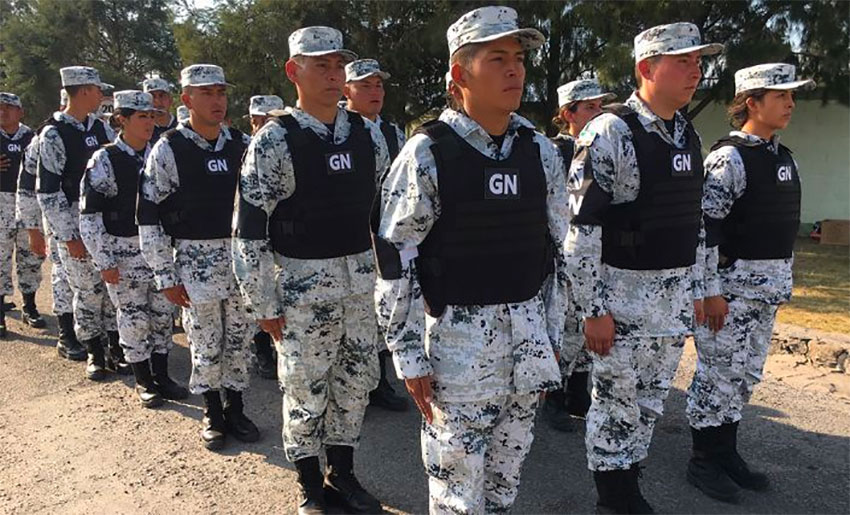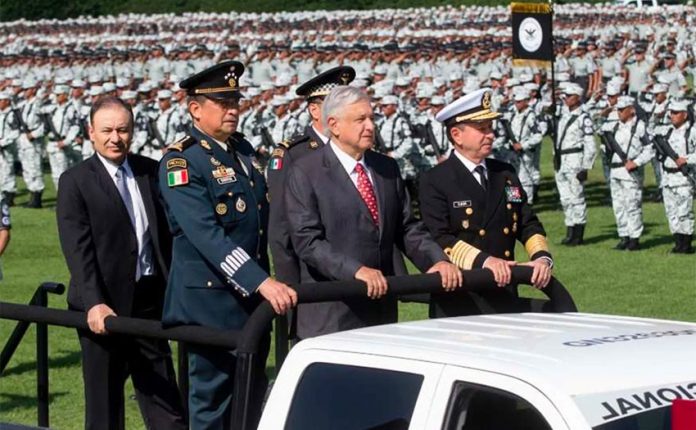Combating insecurity and violence requires the discipline and professionalism of the army and navy, President López Obrador said on Thursday, three days after he published a decree ordering the armed forces to continue carrying out public security tasks for another four years.
Speaking at his morning press conference, López Obrador brushed off criticism that he is militarizing the country, asserting that he is convinced that the armed forces are needed to reduce the high levels of violent crime that plague Mexico.
“Even though they criticize me, [saying] I want to militarize the country, I’m going to continue insisting that the armed forces must help us in public security tasks,” he said.
López Obrador said the only thing that could change his mind would be proof that the military had committed human rights abuses while carrying out public security tasks on his watch.
The armed forces have committed or have been accused of committing a range of human rights violations in the past, including an army massacre of 22 presumed criminals in Tlatlaya, México state, in 2014.
López Obrador said that he was also convinced that the National Guard, the new security force that was supposed to be the centerpiece of his administration’s security strategy, must have a “close relationship” with the military.
“I don’t want … the National Guard to end up like the Federal Police because it would be a complete failure,” he said.
According to some analysts, the president has already conceded that the new security force has failed by publishing Monday’s decree ordering the military to continue carrying out public security tasks until the final year of his six-year term.
Meanwhile, the Mexico office of the United Nations High Commissioner for Human Rights said the decree doesn’t establish sufficient mechanisms for oversight of the military as it carries out the public security tasks the president has entrusted it with.
“The agreement establishes that this supervision will be carried out by the internal control body … of the armed forces, … which is insufficient to guarantee effective supervision of an external nature,” the UN office said.
It said the decree contradicts articles in the constitutional reform that created the National Guard, which stipulate that public security tasks must be carried out under civilian command. The decree also fails “to honor the principles of transparency and accountability that must govern the conduct of all security forces including the armed forces,” the UN office said.

The president’s decision also undermines his attacks on his two most recent predecessors, who both used the armed forces to combat Mexico’s notoriously violent criminal organizations.
López Obrador has repeatedly blamed the high levels of violence that plague Mexico today on the security strategy that was implemented by former president Felipe Calderón – who launched the so-called war on drugs in late 2006 – and perpetuated by Enrique Peña Nieto, who left office in 2018.
Despite pledging that his administration would reduce violence by addressing its root causes through social programs – the so-called “hugs, not bullets” approach – AMLO, as the president is known, is now perpetuating the militarized model himself, seemingly acknowledging that what he has tried to date has not worked.
Indeed, violence remains at alarmingly high levels even as the country hunkers down amid the coronavirus pandemic.
But AMLO’s current confidence in the military belies his attitude in the past, said Héctor de Mauleón, a columnist for the newspaper El Universal, who pointed out that López Obrador was highly critical of the armed forces before he became president.
“The loss of life unleashed since the government of Felipe Calderón ordered the war against narcos, the abuses of power, the violations of human rights, the extrajudicial killings, the enforced disappearances, became … the core of López Obrador’s discourse,” de Mauleón wrote this week.
Before he was president, AMLO declared “time and again” that the military should be taken off the streets and return to their barracks, he said.
“He was frequently heard saying that the army was ‘to defend national sovereignty’ not carry out police work,” de Mauleón wrote.
However, during López Obrador’s presidency, the role of the military has widened even further, the columnist pointed out. Not only is it carrying out public security tasks, it’s also in charge of customs, building the new Santa Lucía airport and delivering petroleum, de Mauleón said.
The army now is the same “inept, negligent and complicit” army that AMLO railed against, adding that the presidential decree published on Monday is not congruent with the expectations López Obrador sowed for years.
“The army in the streets led the country to one of the most painful and bloody periods of its history. López Obrador will keep it there, betraying the words that he said for years, betraying those who voted for him,” de Mauleón wrote.
But from the perspective of Alejandro Hope, a prominent security analyst, AMLO’s legalization of the use of the military in public security tasks is no surprise.
Also writing in El Universal, Hope said that the presidential decree was destined to be published since last year’s approval of the reform that created the National Guard. The reform states that the president has the authority to use the military for public security tasks for a period of five years as the National Guard develops its structure and capacities.
The approval of the reform loaded the gun and all that remained was to pull the trigger, Hope wrote.
He also said that publication of the decree was not surprising given that the National Guard has not recruited a single member on its own. About 80% of its members formerly belonged to the army or navy and the remainder are former Federal Police officers, Hope said.
He said that practically all of the National Guard’s equipment came from the armed forces and its barracks were built by the Ministry of Defense (Sedena) on land donated by Sedena and not the Security Ministry which, on paper, is in charge of the new security force.
“In practice, the National Guard is nothing more than a branch of the army. … It was only a matter of time before the farce was revealed,” Hope wrote.
The “central objective” of the 2019 constitutional reform was not to create the National Guard but to institutionalize military participation in public security tasks, he said.
“The open and direct use of the armed forces in police tasks is what both the president and the military commanders wanted from the beginning. They didn’t opt for this route because the National Guard ‘failed’: that has been nothing but a distraction.”
Source: El Universal (sp), Reforma (sp)
